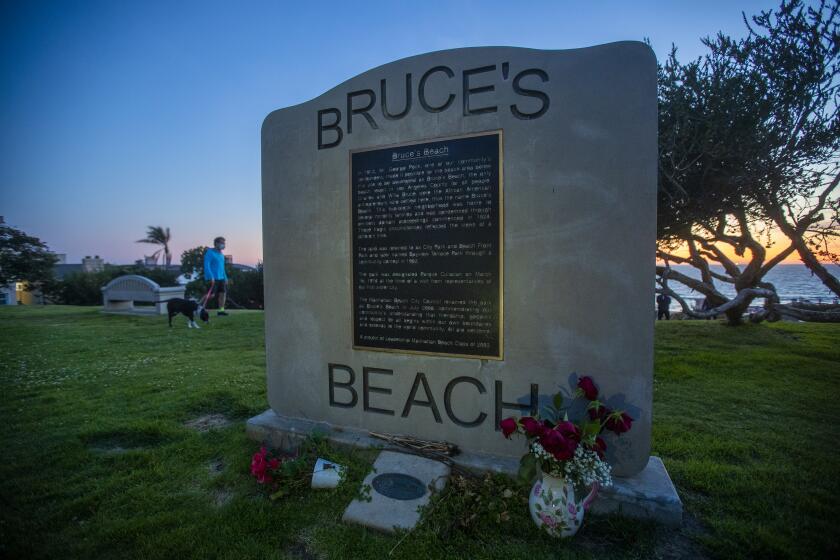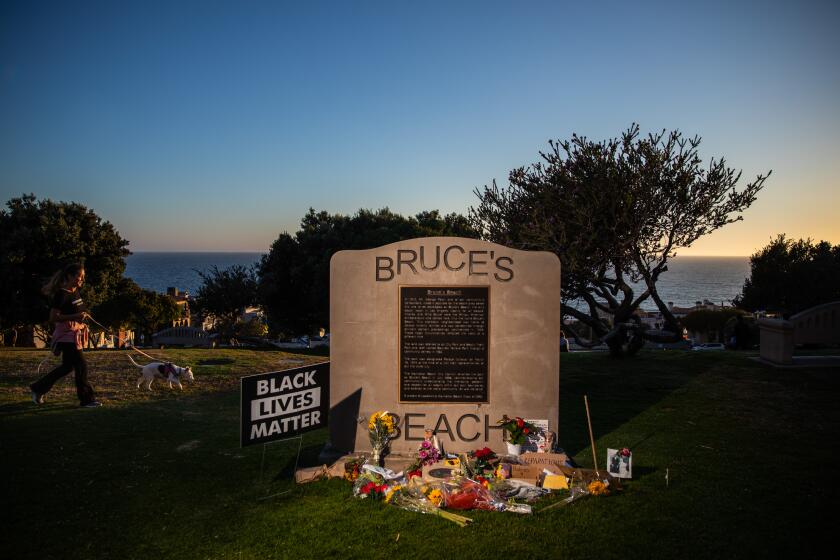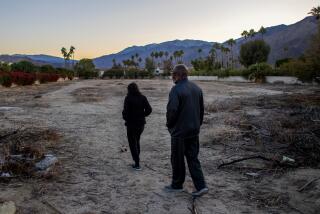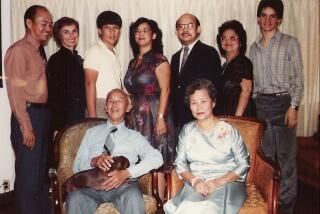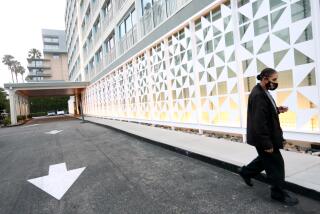Black descendants of Bruce’s Beach owner could get Manhattan Beach land back under plan
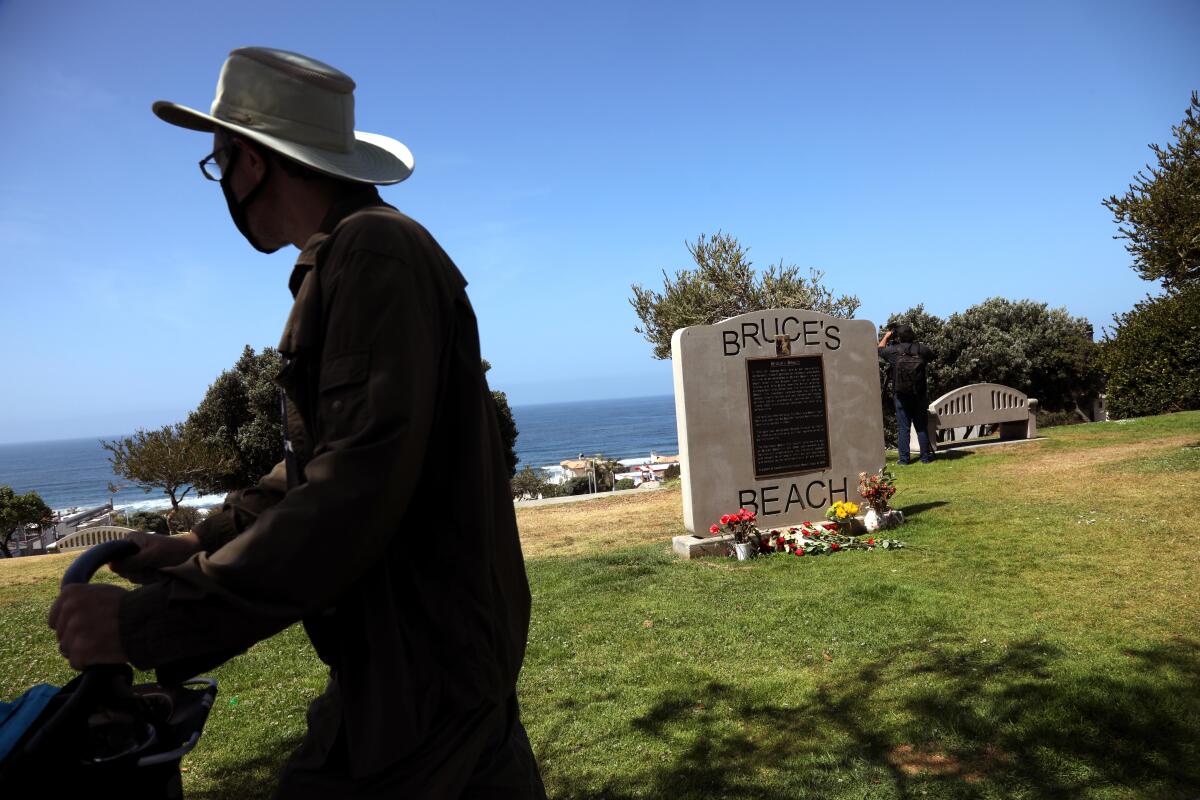
The descendants of a Black family that once owned a thriving oceanfront resort in Manhattan Beach could get the property back under state legislation announced Friday.
Backers of the proposal, which will be introduced by state Sen. Steven Bradford (D-Gardena) on Monday, say it is the first step toward correcting a historic injustice when the city seized the resort of Charles and Willa Bruce and forced Black beachgoers out of town 100 years ago.
The bill, if passed, would allow Los Angeles County, which currently runs a lifeguard center on the site, to transfer the property to the Bruce family. State legislation is necessary to lift the restriction that the state placed on the property when it transferred the two parcels to L.A. County in 1995.
Manhattan Beach won’t apologize for running Black property owners out of town 100 years ago, but a county official seeks to make restitution.
“We stand here today to introduce a bill that will correct this gross injustice and allow the land to be returned to the Bruce family,” Bradford said Friday. “It is my hope that this legislation will not be the last in a series of actions by the state to address centuries of atrocious actions against Black Americans.”
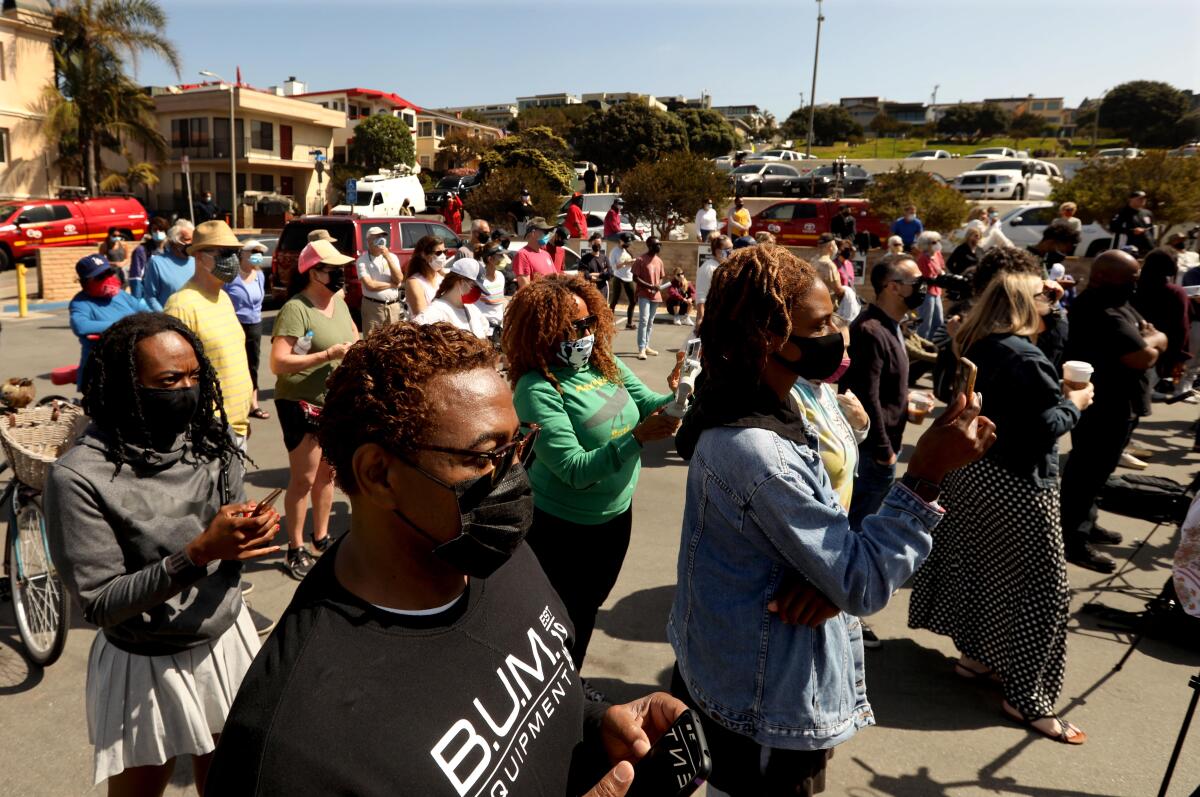
The issue has stirred controversy in this very white city. After hours of heated public testimony, the City Council on Tuesday night voted against issuing an apology, despite many residents urging them to do so. Officials decided, instead, to issue a “statement of acknowledgement and condemnation” of what happened.
Many have said apologizing is an important step forward, while other longtime residents and community leaders have pushed back, arguing that the residents of today shouldn’t apologize for something that happened almost 100 years ago. Some have also expressed concern that issuing a formal apology could open the city up to potential lawsuits.
Designated Bruce family representative Duane Shepard Sr., who is a Pocasset Wampanoag chief and tribal elder from his father’s side, thanked the grass-roots movement Justice for Bruce’s Beach on Friday and spoke out against the way Manhattan Beach city officials have continued to treat his family and their story.
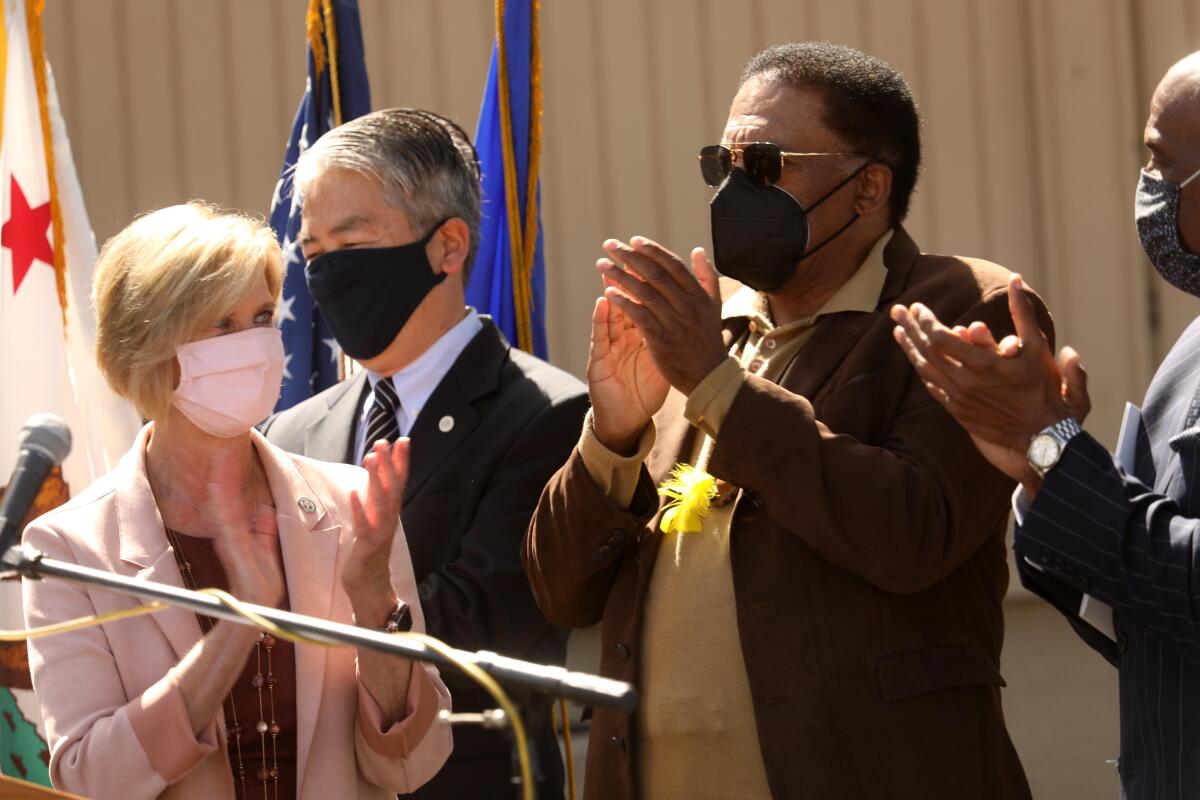
“We reserve our rights on this Earth to be men, to be women, to be human beings, to be given the rights of human beings, to be given the respect of human beings, in this country in this day and in this society in this damn city,” Shepard said.
He said he hopes to have a big Bruce family reunion once they get the land back — and to honor what happened to their ancestors all those years ago.
In 1912, Willa Bruce had purchased for $1,225 the first of two lots along the Strand between 26th and 27th streets. While her husband, Charles, worked as a dining-car chef on the train running between Salt Lake City and L.A., Willa ran a popular lodge, café and dance hall — providing Black families a way to enjoy a weekend on the coast.
Many referred to this area as Bruce’s Beach. A few more Black families, drawn to this new community, bought and built their own cottages by the sea.
Before Manhattan Beach shut it down, Bruce’s Beach was a famous Black-owned beach resort. Now, some want the city to atone for its actions.
The Bruces and their guests faced years of threats and harassment from white neighbors. The Ku Klux Klan purportedly set fire to a mattress under the main deck and torched a Black-owned home nearby.
When racism failed to drive the Bruce’s Beach community out of town, city officials in 1924 condemned the neighborhood and seized more than two dozen properties through eminent domain. The reason, they said, was an urgent need for a public park.
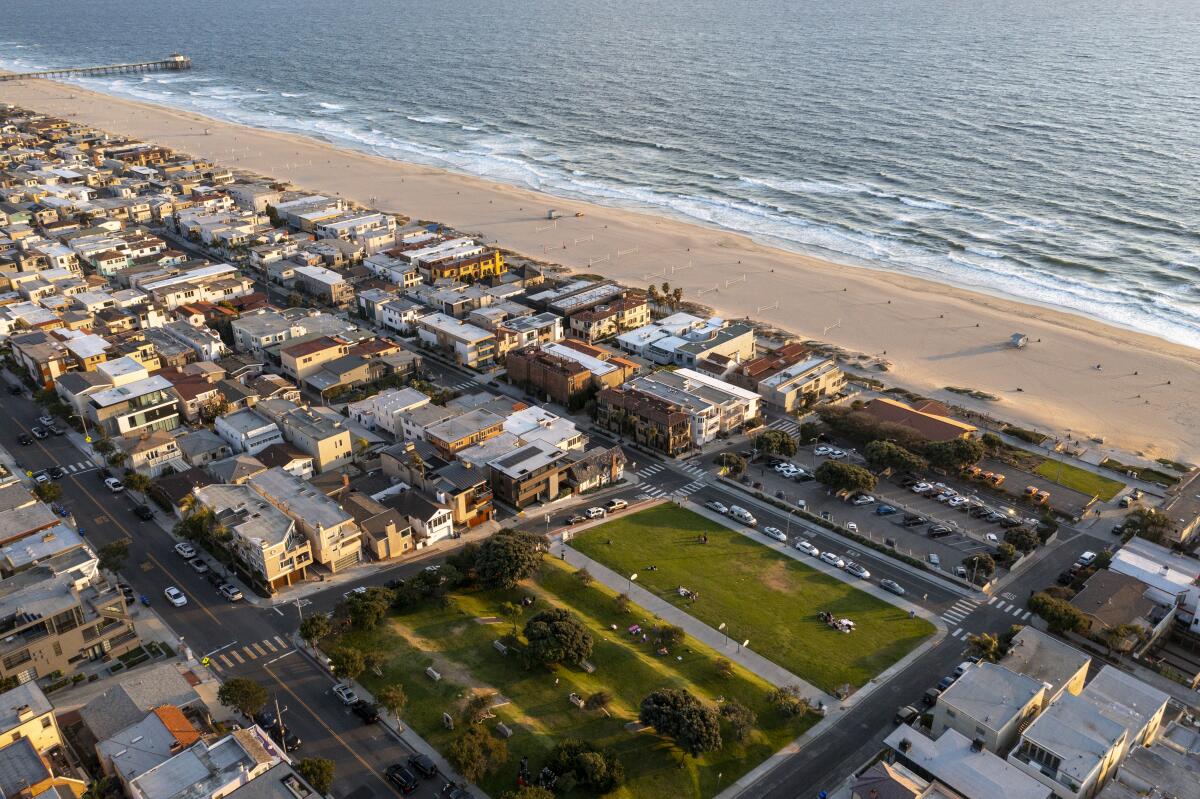
But for decades, the properties sat empty. The Bruce’s oceanfront parcels were transferred to the state in 1948, then to the county in 1995. As for the remaining lots, city officials eventually turned them into a park, which many residents know today as a pretty stretch of grass overlooking the sea.
On Friday morning, standing on the land once owned by the Bruce family, Bradford and numerous county and state leaders addressed a lively crowd that mostly cheered as each person spoke about the injustices that they sought to correct.
“We can’t change what happened to the Bruce family, and the hundreds, maybe thousands of others throughout California’s history who were robbed of their property,” said Supervisor Holly Mitchell, who emphasized that the county isn’t “gifting” anything — it’s returning what was lawfully owned by the Bruce family.
Supervisor Janice Hahn, who had initiated these efforts by the county to return the land, said the county is in discussions with the Bruce family about what’s next — if the bill passes, the county will likely lease the land from the family.
“I believe that the best part about this is that we will be allowed to transfer the property back to the descendants of the family and let them decide what they want to do,” she said. “The Bruce family had their California dream stolen from them.”
For L.A. County Fire Chief Daryl Osby, coming to the lifeguard station in Manhattan Beach has always evoked a deep feeling of sadness.
His grandmother would share memories of driving from their home in San Diego to Bruce’s Beach — a five- to six-hour trek “just to enjoy a peaceful day, safely, here as a beachgoer” because Black families had no options in San Diego or Orange County.
When Bruce’s Beach closed, he said, it essentially eliminated his grandmother’s ability — and the ability for many Black families — to enjoy any beach because the next option in Santa Monica was another hour- to two-hour drive.
Osby only later learned that the beach his grandmother had told him about was the same location where his own agency had a lifeguard facility.
“That never,” he said, “felt good to me.”
More to Read
Start your day right
Sign up for Essential California for news, features and recommendations from the L.A. Times and beyond in your inbox six days a week.
You may occasionally receive promotional content from the Los Angeles Times.
